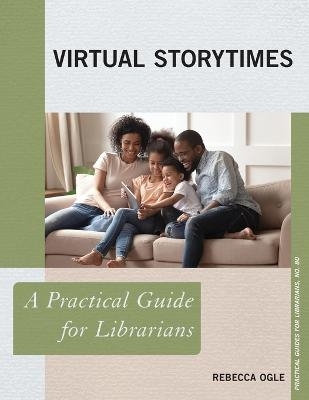
Virtual Storytimes
Rowman & Littlefield (Verlag)
978-1-5381-5850-0 (ISBN)
This is the first book to provide practical guidance for library staff on virtual storytime planning and production. Learn how to design virtual youth services tailored to patrons in different communities, and how virtual programs serve as a form of community outreach.
Included in this guide:
Case studies of successful virtual storytime programs
Creative examples of potential programs, which can be developed and adapted
Simple tips on how to increase production value, regardless of available space and equipment
Features of virtual storytime software with which presenters should familiarize themselves
A comprehensive list of websites, software applications, and assets for creating and sharing virtual programs
An overview of laws concerning online privacy and the use of copyrighted materials in virtual storytimes
Background information and talking points addressing the benefits and drawbacks of screen time for young patrons
Sample training syllabus, outline, script, and reflection questions for virtual storytime staff
Children’s librarians will find useful case studies, tips, and resources in this volume.
Rebecca Ogle began her career as a content writer and digital marketer, before pursuing her passion for library services. Before COVID-19, she focused her outreach efforts on inclusivity and accessibility to literacy programs and resources for low-income and unhoused families. When Phoenix Public Libraries closed to the public, the Early Literacy Outreach Team (ELOT) sprang into action researching and developing a wide range of virtual programs, both pre-recorded and live. Rebecca and her ELOT colleagues earned a Service Excellence Award from the City of Phoenix for their creativity and efficacy adapting library programs for online patrons. While every member of ELOT, and a number of Phoenix Public Library branch staff, brought their own strengths to virtual storytimes, Rebecca discovered a particular knack for engaging audiences in her low-key, soothing style. She is passionate about equity, inclusivity, and access to library resources, and believes virtual storytimes can truly make a difference in every community.
Preface
Chapter 1: Choosing A Virtual Format
Identifying audiences and developing goals
Synchronous versus asynchronous storytimes
Exploration of virtual formats
Chapter 2: Technological Considerations
Hardware requirements and recommendations for library staff and patrons
Accessibility best practices
Web conferencing software features
Image, presentation, and video software features
File storage and organization
Chapter 3: Legal Issues
Privacy Laws
Storytime and Fair Use
Public domain and original content
Creative Commons and attribution
Copyright and permissions
Avoiding issues with copyright algorithms
Chapter 4: Planning and Preparation
Planning: Now With More Technology
Production quality tips
Planning interactive virtual storytimes
Book and media selection
Preparing outlines and scripts
Chapter 5: Showtime
Strategies for common challenges
Best practices during synchronous storytimes
Best practices for recording
Finishing touches in editing
Chapter 6: Engaging Staff
Key competencies for virtual storytime staff
Screen time and media mentorship
Training for virtual storytime
Avoiding and addressing staff burnout
Chapter 7: Outreach and Promotion
Creating meaningful partnerships
The marketing funnel
Digital marketing best practices
Social media engagement methods
Appendix A: Software and Websites for Content Creators
Appendix B: Case Study: Read With Us TV Series
Appendix C: Case Study: Daniel Tiger Storytime on Facebook Live
Appendix D: Sample Outline, Script, and Reflection
| Erscheinungsdatum | 11.07.2022 |
|---|---|
| Reihe/Serie | Practical Guides for Librarians |
| Verlagsort | Lanham, MD |
| Sprache | englisch |
| Maße | 221 x 262 mm |
| Gewicht | 440 g |
| Themenwelt | Kunst / Musik / Theater ► Theater / Ballett |
| Sozialwissenschaften ► Kommunikation / Medien ► Buchhandel / Bibliothekswesen | |
| ISBN-10 | 1-5381-5850-7 / 1538158507 |
| ISBN-13 | 978-1-5381-5850-0 / 9781538158500 |
| Zustand | Neuware |
| Haben Sie eine Frage zum Produkt? |
aus dem Bereich


